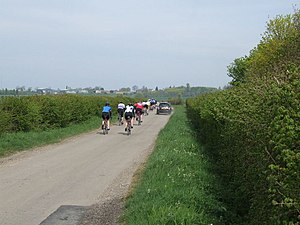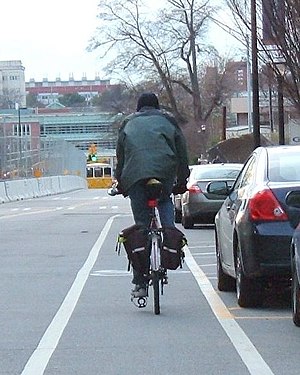Drivers seem to think cyclists should be somewhere else, or at the very least in the bike lane, or the gutter if there's no path. Anywhere they won't be in the way, frustrating the driver's need to be braking behind the car in front.
Cyclists should absolutely, definitely, not be riding two abreast, slowing down the cars behind, forcing a correct overtaking manoeuvre. That's a deliberate challenge to the motorists superior rights, to which they're entitled, by virtue of the road tax they pay.
From the other perspective, cyclists believe drivers should be patient and considerate of the cyclist's problems. The two wheeled, lycra clad athletes believe themselves entitled to ride on the roads, swerve to avoid the craters near the kerbside (left un-repaired by councils, because they don't bother car drivers), ride in groups two abreast so they can chat to colleagues, at speeds of 20 miles per hour, or less, to accommodate the weaker bikers.
Car drivers should absolutely, definitely, not pass by too close or too fast, honk their horns, pull out in front of, or across their path, act aggressively, or make up their own Highway Code.
Too often, the two sides only get to discuss their differences in the heat of a near miss incident, and the cyclist is always going to lose the argument.
That's why the No. 1 principle in anybody's Safe Cycling Strategy should be
'Assume every driver is a blind moron, until proven to be otherwise.'
Of course, generalising about people is a mistake. There are always exceptions which prove rules. For every ill-mannered, ignorant, aggressive driver there's a polite, considerate, generous and patient version.
But wouldn't it be nice if we could know which was which, and ride accordingly?
Personal experience suggests some drivers are more likely to be a danger than others. And they can be categorised by vehicle. You can know which drivers are more likely to be be 'Dickheads' by the car they drive.
Here's my list of the worst offenders:
- White Vans.
- Chelsea Tractors
- BMW's
- Audi's
- Mini Coopers
- Nissan Pickups
- Old Corsas with big exhaust pipes
- anything driven by a 'Blonde'
- any car with a 'Baby on Board' sticker
- any car with a Mountain Bike on the roof





































